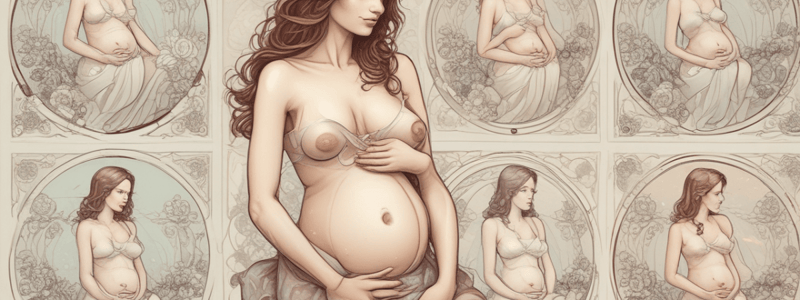Podcast
Questions and Answers
What is the duration of a typical pregnancy?
What is the duration of a typical pregnancy?
- 40 weeks (correct)
- 50 weeks
- 12 weeks
- 30 weeks
Which stage of childbirth involves the cervix dilating from 4 to 7 cm?
Which stage of childbirth involves the cervix dilating from 4 to 7 cm?
- Active labor (correct)
- Transition
- Early labor
- Delivery
What is one common complication that can occur during pregnancy?
What is one common complication that can occur during pregnancy?
- Heart attack
- Appendicitis
- Arthritis
- Gestational diabetes (correct)
What is typically monitored during the postpartum period?
What is typically monitored during the postpartum period?
What is the duration of the postpartum period?
What is the duration of the postpartum period?
What does prenatal care typically include?
What does prenatal care typically include?
What psychological aspect is important during pregnancy?
What psychological aspect is important during pregnancy?
What are maternity leave policies primarily concerned with?
What are maternity leave policies primarily concerned with?
Flashcards are hidden until you start studying
Study Notes
Definition of Maternity
- Refers to the state of being a mother.
- Encompasses pregnancy, childbirth, and the postpartum period.
Maternity Stages
-
Pregnancy
- Duration: Approximately 40 weeks.
- Trimester Breakdown:
- First Trimester (week 1-12)
- Second Trimester (week 13-26)
- Third Trimester (week 27-birth)
- Physical and hormonal changes occur.
-
Childbirth
- Stages of labor:
- Early labor: cervix dilates to 3 cm.
- Active labor: cervix dilates from 4 to 7 cm.
- Transition: cervix dilates from 8 to 10 cm.
- Delivery methods:
- Vaginal birth
- Cesarean section (C-section)
- Stages of labor:
-
Postpartum Period
- Duration: Approximately 6 weeks after childbirth.
- Physical recovery: uterine involution, hormonal changes.
- Emotional changes: "baby blues," postpartum depression, anxiety.
Maternity Care
-
Prenatal Care:
- Regular check-ups to monitor health of mother and fetus.
- Includes ultrasounds, blood tests, and screenings.
-
Birth Planning:
- Discuss preferences for labor, delivery, and postpartum care.
-
Postnatal Care:
- Monitoring recovery and infant care.
- Support for breastfeeding and mental health.
Maternity Rights
- Maternity leave policies:
- Varies by country; includes job protection and pay.
- Importance of workplace accommodations for pregnant individuals.
Health Considerations
- Nutrition: Balanced diet essential for fetal development.
- Exercise: Safe physical activity recommended unless contraindicated.
- Common complications:
- Gestational diabetes
- Preeclampsia
- Preterm labor
Psychological Aspects
- Impact on mental health during and after pregnancy.
- Importance of support systems (family, friends, healthcare providers).
Cultural Perspectives
- Variations in maternity practices and beliefs across cultures.
- Importance of understanding cultural differences in maternity care.
Definition of Maternity
- State of being a mother, encompassing pregnancy, childbirth, and the postpartum period.
Maternity Stages
-
Pregnancy
- Lasts about 40 weeks, divided into three trimesters:
- First Trimester: weeks 1-12
- Second Trimester: weeks 13-26
- Third Trimester: weeks 27 until birth
- Involves significant physical and hormonal changes.
- Lasts about 40 weeks, divided into three trimesters:
-
Childbirth
- Stages of labor include:
- Early Labor: cervix dilates to 3 cm
- Active Labor: cervix dilates from 4 to 7 cm
- Transition: cervix dilates from 8 to 10 cm
- Delivery methods consist of vaginal birth and cesarean section (C-section).
- Stages of labor include:
-
Postpartum Period
- Lasts approximately 6 weeks following childbirth.
- Involves physical recovery such as uterine involution and hormonal adjustments.
- Emotional changes may include "baby blues," postpartum depression, and anxiety.
Maternity Care
-
Prenatal Care
- Regular health check-ups to monitor both mother and fetus.
- Involves ultrasounds, blood tests, and various screenings.
-
Birth Planning
- Important discussions regarding preferences for labor, delivery, and postpartum care.
-
Postnatal Care
- Focuses on recovery monitoring and infant care.
- Includes support for breastfeeding and mental health.
Maternity Rights
- Maternity leave policies differ by country and typically provide job protection and pay.
- Workplace accommodations are crucial for individuals who are pregnant.
Health Considerations
-
Nutrition
- Balanced diet is essential for healthy fetal development.
-
Exercise
- Safe physical activity is recommended unless contraindicated.
-
Common Complications
- May include gestational diabetes, preeclampsia, and preterm labor.
Psychological Aspects
- Pregnancy and postpartum periods significantly affect mental health.
- Support systems, including family, friends, and healthcare providers, are vital.
Cultural Perspectives
- Maternity practices and beliefs vary widely across different cultures.
- Understanding these cultural differences is essential for providing effective maternity care.
Studying That Suits You
Use AI to generate personalized quizzes and flashcards to suit your learning preferences.




